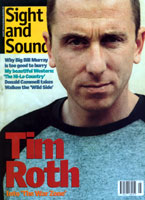Primary navigation

UK/USA/South Africa 1998
Reviewed by Kieron Corless
Our synopses give away the plot in full, including surprise twists.
Pietermaritzburg, South Africa, the present. President Mandela revisits the spot where he and Cecil Williams, a white homosexual freedom fighter, were arrested in 1962. Williams grew up in Cornwall, UK, but moved to Johannesburg in 1928. He became a Communist and a schoolteacher, switching to journalism during World War Two. After the war, he entered the theatre and joined the Springbok Legion, an anti-fascist organisation with no colour bar. Williams deployed his considerable public speaking and street-fighting skills during elections but the Nationalists took power, passing the notorious pass laws. The Springbok Legion was forced underground. Although Williams experienced a severe gay-bashing, his political colleagues generally turned a blind eye to his homosexuality.
Apartheid was vigorously implemented during the 50s but Williams found ways to work regularly with black actors. Resistance to the pass laws gradually gained momentum, culminating in the Sharpeville massacre in March 1960. Numerous activists were jailed and Mandela left the country to raise international support for the liberation struggle. Williams was selected to pick Mandela up at the border to smuggle him back into the country, disguised as Williams' chauffeur. Williams' decision to share the driving raised suspicions and they were arrested. Williams was released the next day but, facing prolonged house arrest, decided to leave the country. He settled in London where he died in 1979.
"What kind of a white guy is this?" wonders actor Corney Mabaso at one point, referring with bemused affection to Cecil Williams, the man in the car with Mandela the day he was arrested. Twenty years after his death, director Greta Schiller and writer Mark Gevisser set out to answer this question and recover Williams from the margins of South African history. They achieve this through an intricate mapping of the political and sexual landscape of cosmopolitan 50s Johannesburg. Flamboyant homosexual, ANC activist, prominent theatre director and dandified bon viveur - the morally courageous, chameleon Englishman Williams lived right at the seething hub of his era, never far from danger, intrigue and the next cocktail party. The film deftly knits together Williams' compartmentalised lives, negotiating these distinct social worlds with the same surefooted verve as its louche protagonist.
Paris Was a Woman, Schiller's previous film, was a similarly multi-textured collage of period footage and interviews. Here, the interspersal of dramatic monologues, drawing on Williams' own writings, provides the principal development and is reminiscent of Mark Rappaport's moving film From the Journals of Jean Seberg. It was a brave decision to use this device, but it's not entirely successful here. Shot on a stylised, theatrically lit set, these fragments permit insights into this complex man's emotional conflicts and contradictions. But in view of recurrent testimony to Williams' charm, wit and forcefulness ("He was teaching us to be assertive," recalls one black performer), we rarely see those qualities in Corin Redgrave's stagy, often wistful soliloquising.
The film's real strength lies in its unfailingly precise selection of vivid anecdotes and archive material, interwoven to evoke the man and the times with illuminating immediacy. One ravishingly colourful home movie depicts frolicking white theatre types camping it up on the beach. Black men conscripted into the Army, meanwhile, were learning drill with spears rather than guns which they weren't allowed even in battle. An ex-pupil at one of South Africa's exclusive government schools where Williams taught recounts his sublime response to the boys' standing to attention as he entered the classroom - "Sit down you fucking little fascists." Time and again, interviewees illustrate with humour and a real sense of kinship the invisible threads of influence connecting Williams to those whose lives he touched. Issues such as interracial gay sex and freedom fighters' often antediluvian views on homosexuality are not glossed over but treated with glancingly penetrating insight. It's a meticulously researched, quietly powerful piece of historical excavation, finally according an unsung hero his rightful place in the South African pantheon.